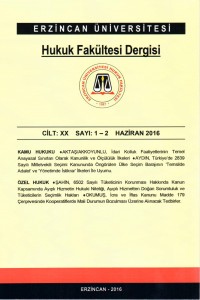THE CONFORMITY OF THE COUNTRY ELECTORAL THRESHOLD REGULATED BY THE PARLIAMENTARY ELECTION LAW NUMBERED 2839 WITH THE PRINCIPLES OF ‘FAIR REPRESENTATON’ AND ‘STABILITY IN ADMINISTRATION’ IN TURKEY
Abstract
The Constitution of 1982 regulates two main principles that must be followed while electoral laws are enacted. In this regard, electoral laws will be enacted in a way to satisfy the principles of “fair representation” and “stability in administration”. However, the satisfaction of both principles at the same time is quite difficult. It is possible to violate the principle of stability in administration when the focus is given to the principle of fair representation, and vice versa. In this case, the optimal solution can be available by making concession from both principles to a certain extent. The regulation related to these principles did not exist in the original form of the Constitution of 1982 but it was inserted into Article 67 of the Constitution with the Law Numbered 4121 in 1995. According to Article 33 of the Parliamentary Electoral Law Numbered 2839 which was entered into force before the constitutional amendment states that no candidates of a political party which has not obtained more than 10% of all of the valid votes in Turkey as a whole or, in the case of by-elections, in all of the by-election districts shall enter the parliament. In this case, the problem of conformity between the electoral threshold of 10% and the principle of “fair representation” and “stability in management” arises. In this article, the conformity of the country electoral threshold that is quite high when it compared with other democratic countries’s regulations with the principles of “fair representation” and “stability in administration” will be analyzed. At the same time, the problems raised from the electoral threshold of 10% will be mentioned.
Keywords
“Electoral systems” “electoral thresholds” “the fair representation principle” “the stability in administration principle” “the electoral threshold of 10%”.
References
- ARASLI, Oya, Seçim Sistemleri Kavramı ve Türkiye’de Uygulanan Seçim Sistemleri (1876-1987), Ankara, 1989. ATAR, Yavuz, “Seçim Hukukun Güncel Sorunları”, Anayasa Yargısı, S.23, Ankara, 2006, s.211-235.
- BULUT, Nihat, “Temsilde Adalet - Yönetimde İstikrar İkilemi Bağlamında 12 Haziran 2011 Seçimleri”, Erzincan Üniversitesi Hukuk Fakültesi Dergisi, C.XIV, S.3-4, 2010, s.1-18; ,01.11.2016 .
- ÇAĞLAR, Bakır, “Anayasa Mahkemesi Kararlarında Demokrasi”, Anayasa Yargısı, S.5, Ankara, 1990, s.51-127. DAVER, Bülent: “Seçim Sistemi ve Anayasa Yargısı”, Anayasa Yargısı, S.5, Ankara, 1989, s.131-147.
- ERDOĞAN, Mustafa, Anayasal Demokrasi, 5. B., Siyasal Kitabevi, Ankara, 2003.
- GÖKSEL, Türkmen / Çınar, Yetkin, “12 Haziran 2011 Seçiminde Seçim Sisteminin Parlamento Yapısına Etkileri”, Politika Notu, Türkiye Ekonomi Politikaları Araştırma Vakfı, 2011, Haziran, ,01.11. 2016.
TÜRKİYE’DE 2839 SAYILI MİLLETVEKİLİ SEÇİMİ KANUNUNDA ÖNGÖRÜLEN ÜLKE SEÇİM BARAJININ ‘TEMSİLDE ADALET’ VE ‘YÖNETİMDE İSTİKRAR’ İLKELERİ İLE UYUMU
Abstract
1982 Anayasası, seçim kanunları yapılırken uyulması gerekli olan iki temel ilkeye yer vermiştir. Buna göre, seçim kanunları, Anayasada öngörülen “temsilde adalet” ve “yönetimde istikrar” ilkelerini bağdaştıracak biçimde düzenlenecektir. Ancak, bu iki ilkenin birbiriyle bağdaştırılması oldukça güçtür. Çünkü, temsilde adalet ilkesine ağırlık verildiğinde, yönetimde istikrar ilkesinin, yönetimde istikrar ilkesine ağırlık verildiğinde ise, temsilde adalet ilkesinin ihlali söz konusu olabilecektir. Bu durumda, her iki ilkeden belli ölçüde ödün verilmesi ile uygun bir çözüm bulunabilir. Söz konusu ilkelere ilişkin düzenleme, 1982 Anayasasının ilk şeklinde yer almamış ancak 1995 yılında 4121 sayılı Kanunla Anayasanın 67. maddesine bir fıkra eklenmek suretiyle gerçekleştirilmiştir. Anayasal düzenlemeden önce yürürlüğe konulan 2839 sayılı Milletvekili Seçimi Kanununda (m.33) ise, milletvekili genel seçimlerinde ülke genelinde, ara seçimlerde seçim yapılan çevrelerin tümünde, geçerli oyların yüzde onunu geçemeyen siyasal partilerin milletvekili çıkaramayacakları düzenlenmiştir. Bu durumda, 2839 sayılı Kanunda öngörülen yüzde on ülke barajı ile uyulması zorunlu “temsilde adalet” ve “yönetimde istikrar” ilkelerinin birbirleriyle uyumu sorunu ortaya çıkmaktadır. Bu çalışmada, diğer demokratik ülkelerdeki düzenlemelerle karşılaştırıldığında oldukça yüksek olan yüzde on ülke seçim barajının Anayasada öngörülen “temsilde adalet” ve “yönetimde istikrar” ilkeleri ile uyumu konusu incelenmektedir. Öte yandan, yüzde on ülke barajının seçimler sonucunda ortaya çıkardığı sorunlara da yer verilmektedir.
References
- ARASLI, Oya, Seçim Sistemleri Kavramı ve Türkiye’de Uygulanan Seçim Sistemleri (1876-1987), Ankara, 1989. ATAR, Yavuz, “Seçim Hukukun Güncel Sorunları”, Anayasa Yargısı, S.23, Ankara, 2006, s.211-235.
- BULUT, Nihat, “Temsilde Adalet - Yönetimde İstikrar İkilemi Bağlamında 12 Haziran 2011 Seçimleri”, Erzincan Üniversitesi Hukuk Fakültesi Dergisi, C.XIV, S.3-4, 2010, s.1-18; ,01.11.2016 .
- ÇAĞLAR, Bakır, “Anayasa Mahkemesi Kararlarında Demokrasi”, Anayasa Yargısı, S.5, Ankara, 1990, s.51-127. DAVER, Bülent: “Seçim Sistemi ve Anayasa Yargısı”, Anayasa Yargısı, S.5, Ankara, 1989, s.131-147.
- ERDOĞAN, Mustafa, Anayasal Demokrasi, 5. B., Siyasal Kitabevi, Ankara, 2003.
- GÖKSEL, Türkmen / Çınar, Yetkin, “12 Haziran 2011 Seçiminde Seçim Sisteminin Parlamento Yapısına Etkileri”, Politika Notu, Türkiye Ekonomi Politikaları Araştırma Vakfı, 2011, Haziran, ,01.11. 2016.
Details
| Primary Language | Turkish |
|---|---|
| Subjects | Law in Context |
| Journal Section | Research Articles |
| Authors | |
| Publication Date | June 1, 2016 |
| Submission Date | March 1, 2016 |
| Published in Issue | Year 2016 Volume: XX Issue: 1-2 |



